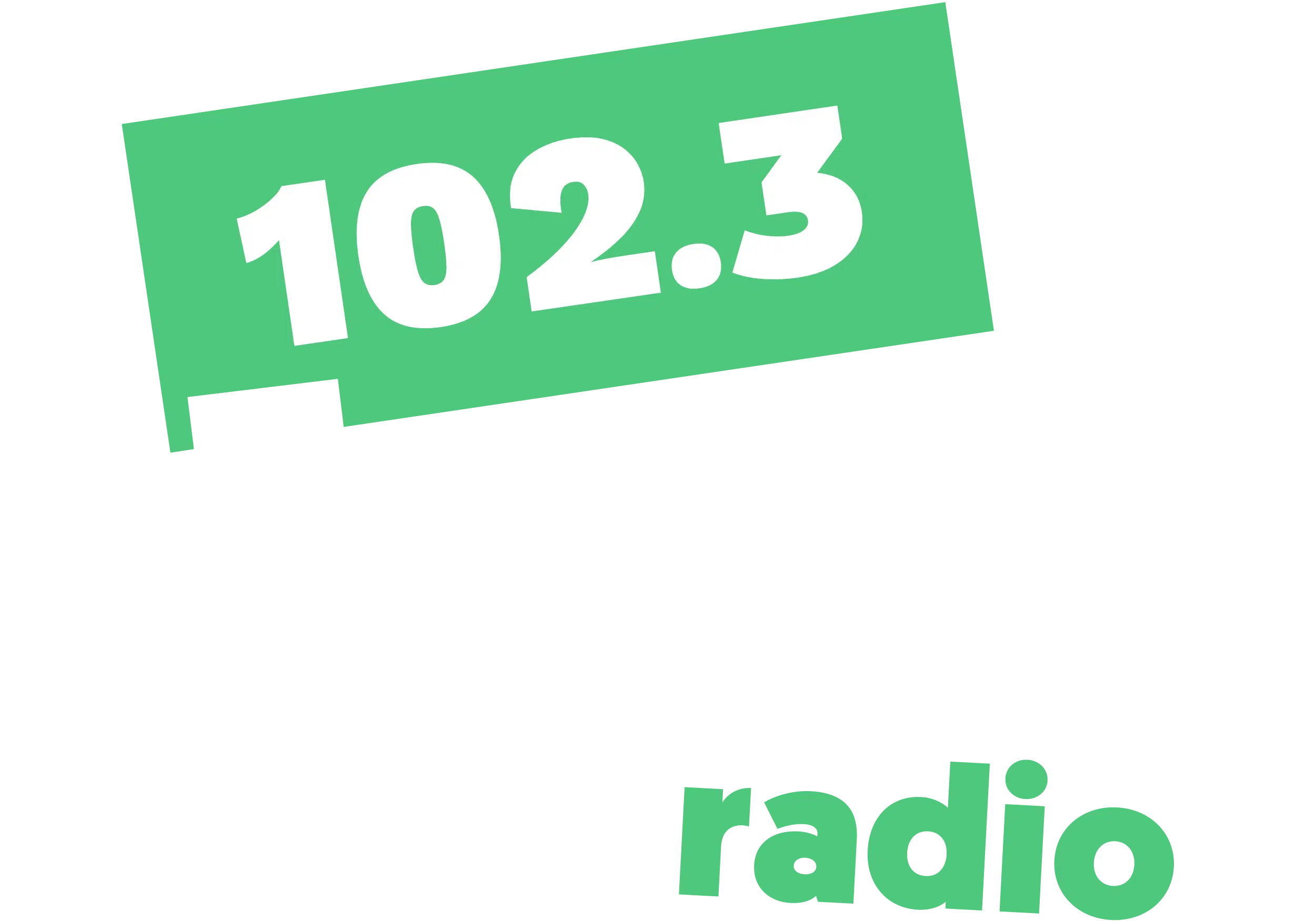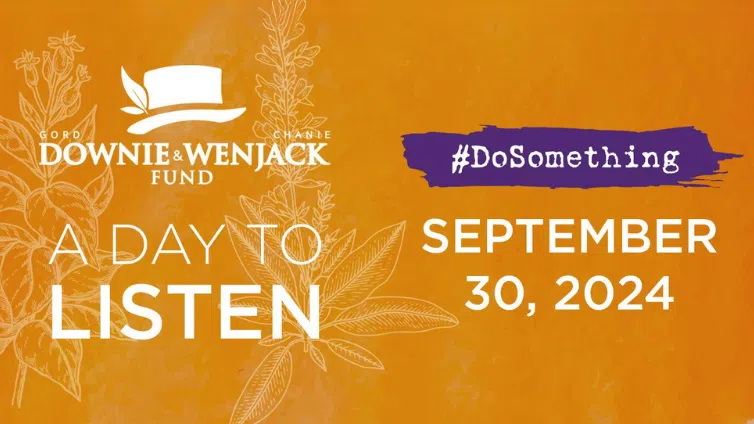A DAY TO LISTEN:
102.3 NOW! radio Pausing The Conversation
In recognition of tomorrow’s National Day for Truth and Reconciliation 102.3 NOW! radio will be pausing the conversation to air A DAY TO LISTEN 2024. This year, A Day To Listen will highlight the voices and stories of Indigenous people around the theme of All My Relations. All My Relations is a term used by some Indigenous Peoples of Turtle Island to express that everything is interconnected. Humans, animals, insects, plants, and inanimate objects are all related. We are connected through ancestors, land, communities, air, water – everything. Guests will speak about Indigenous identity through conversations about representation in sports and entertainment, Indigenous comedy as culture and healing, merging traditional and contemporary fashion, the challenges of healthcare in the north and beyond, reconciliation as recolonization, and more. . Tune in Sept 30th, 6AM – 6PM local time.
ABOUT: The first A DAY TO LISTEN took place on June 30, 2021, following the public announcement that the remains of 215 children were buried at the site of the former Kamloops Residential School. With more than 540 radio stations participating, spanning different markets, regions, and formats, A DAY TO LISTEN leveraged the power of radio to inspire people throughout Canada to move reconciliation forward in meaningful ways. Programming was aired again on September 30, 2021, the inaugural National Day for Truth and Reconciliation.
Learn
The Truth and Reconciliation Commission (TRC) provided those directly or indirectly affected by the legacy of the Indian Residential Schools system with an opportunity to share their stories and experiences.
The City is on a journey of building good relations with Indigenous Peoples – in the spirit and intent of the Edmonton Urban Aboriginal Accord.
Edmonton Urban Aboriginal Dialogue Process took place in 2005 and resulted in the creation of the Urban Aboriginal Accord. The following report and appendices captures the concerns, dreams and aspirations from some of the approximately 1800 people from Indigenous communities who were engaged during the process.
Indigenous Canada is a Massive Open Online Course (MOOC) from the Faculty of Native Studies that explores Indigenous histories and contemporary issues in Canada.
From an Indigenous perspective, this course explores key issues facing Indigenous peoples today from a historical and critical perspective highlighting national and local Indigenous-settler relations.
Indigenous Canada is for students from faculties outside the Faculty of Native Studies with an interest in acquiring a basic familiarity with Indigenous/non-Indigenous relationships.
The Caring Society works to ensure the safety and well-being of First Nations youth and their families through education initiatives, public policy campaigns and providing quality resources to support communities. Using a reconciliation framework that addresses contemporary hardships for Indigenous families in ways that uplift all Canadians, the Caring Society champions culturally based equity for First Nations children and their families so that they can grow up safely at home, be healthy, achieve their dreams, celebrate their languages and culture and be proud of who they are. The Caring Society proudly works with our partners in Canada and around the world to promote the rights of Indigenous children.
The NCTR is a place of learning and dialogue where the truths of the residential school experience will be honoured and kept safe for future generations.
The NCTR was created as part of the mandate of the Truth and Reconciliation Commission of Canada (TRC). The TRC was charged to listen to Survivors, their families, communities and others affected by the residential school system and educate Canadians about their experiences. The resulting collection of statements, documents and other materials now forms the sacred heart of the NCTR.
The NCTR Archives and Collections is the foundation for ongoing learning and research. Here, Survivors, their families, educators, researchers, and the public can examine the residential school system more deeply with the goal of fostering reconciliation and healing.
Take Action
Since news broke of the uncovered remains of 215 children buried at the site of the former Kamloops Indian Residential School, both Indigenous Peoples and non-Indigenous Canadians have been expressing widespread grief in person and across social media.
With this outpouring of grief, many are asking what to do next. There is a path to build upon the stories of these 215 children in the same way that remembering stories like Chanie Wenjack’s changed conversations about reconciliation across Canada. Together we can ensure that the lives of these 215 children and children across Canada who died while attending the residential school system are honoured.
Individuals, families, communities, and organizations can take the pledge and create their own ways to act. This is a call to action, not a prescribed path to achieve the change.
The remains of 215 Indigenous children killed in a Residential School in B.C. were found in May 2021, with thousands more still unaccounted for. Over seven generations of Indigenous people continue to feel indescribable effects of personal and intergenerational trauma to this day. This is not just a historical issue; it is also a current issue.
For all of us in Canada, this moment should be one of national grieving.
We as settlers need to own that; we need to sit with the discomfort of our country’s actions. We have to accept that while we might not be directly responsible, we still greatly benefit from colonialism in Canada. We need to understand that we can love this country and know it needs to be better.
Our government has a responsibility to do better, but so do we. We can’t just mourn; we need to do more, individually as settlers and collectively as a settler nation.
We all have a part to play in Truth & Reconciliation, and since our government isn’t stepping up, then we, the people, must.
The Caring Society works to ensure the safety and well-being of First Nations youth and their families through education initiatives, public policy campaigns and providing quality resources to support communities. Using a reconciliation framework that addresses contemporary hardships for Indigenous families in ways that uplift all Canadians, the Caring Society champions culturally based equity for First Nations children and their families so that they can grow up safely at home, be healthy, achieve their dreams, celebrate their languages and culture and be proud of who they are. The Caring Society proudly works with our partners in Canada and around the world to promote the rights of Indigenous children.
We at Indian Residential School Survivor Society (IRSSS) strive to provide physical, emotional, intellectual, spiritual growth, development, and healing through culturally-based values and guiding principles for Survivors, Families, and Communities.
Awo Taan Healing Lodge fundraises for 100% of our dollars, relying on support from corporate and multi-year agreements, public organizations, and individual donations. Through a variety of giving options, we ask you to donate to end family violence and abuse in Calgary.
Your gift will provide Awo Taan Healing Lodge Women’s Shelter the resources needed to continue to provide quality services to women, children and families whose lives have been affected by family violence. We are committed to being good stewards of your donations. Please take a moment to make a gift to Awo Taan Healing Lodge. You can designate your gift to the Awo Taan Women’s shelter or Parent Link or our Community Programs, or where the most need is.
CNFC was organized to help Indigenous newcomers to the city with referral services and social and recreational programs.
It was, and remains, a gathering place for meetings, social events, and community gatherings. Today, the Centre continues to provide cultural, recreational and social programming.
We serve approximately 10,000 people annually through various programs, services and functions.
The Centre is able to provide these services through the work of volunteers who expend approximately 5,000 hours on an annual basis.
Events / Indigenous History month
APTN Indigenous Day Live (IDL) brings Indigenous and non-Indigenous people together in celebration of National Indigenous Peoples Day (NIPD) and the summer solstice. Through cultural and musical performances, IDL honours the unparalleled achievements of First Nations, Inuit and Métis people across Turtle Island. Each year, IDL presents a refreshing lineup of collaborations in English, French and a variety of Indigenous languages. Held annually since 2007 on the Saturday closest to NIPD, the multi-platform broadcast is available to audiences in Canada via APTN, APTN lumi and participating Indigenous radio stations.
What is National Indigenous Peoples Day?
National Indigenous Peoples Day is a day for all Canadians to recognize and celebrate the unique heritage, diverse cultures, and outstanding achievements and contributions of First Nations, Inuit and Métis Peoples. National Aboriginal Day, as it was named at the time, was first celebrated on June 21, 1996, after being recognized through a proclamation by then Governor General Roméo LeBlanc.
On June 21, 2017, Prime Minister Justin Trudeau issued a statement announcing the government’s intention to rename National Aboriginal Day to National Indigenous Peoples Day. National Indigenous Peoples Day is part of Celebrate Canada days, although most provinces do not recognize it as a statutory holiday.


